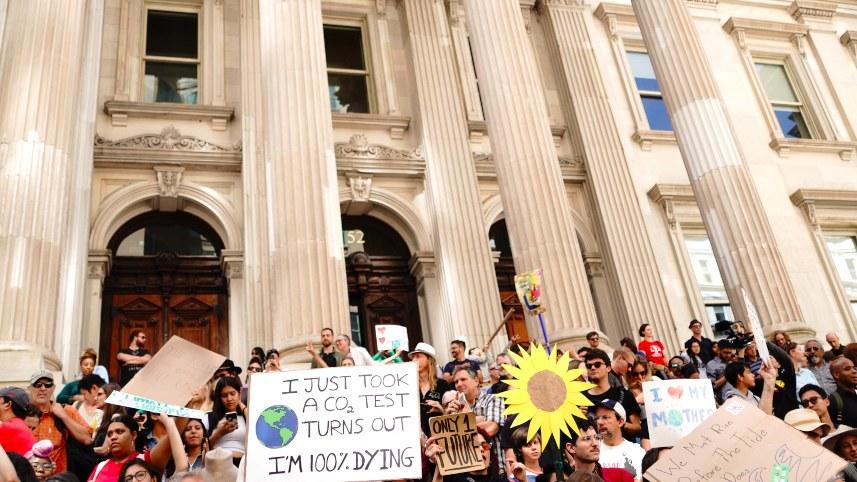No fewer than 18 measures to support climate change education in the public schools were active in the statehouses of ten states so far in 2020. Here is a quick review and update. (Note that owing to the disruption of legislative activity by the COVID-19 pandemic, the status of these measures is not always clear.)
- Arizona's Senate Bill 1368 would have required the state science standards to "include instruction on climate change using the 2013 Next Generation Science Standards." The bill apparently died in committee.
- California's Assembly Bill 1922 would amend California's adopted course of study for science to include "coursework including material on the causes and effects of climate change." The bill is pending in committee. [Update: the bill apparently died in committee on June 19, 2020.]
- Connecticut's House Bill 5215 (PDF) would have required the teaching of climate change in science classes consistent with the Next Generation Science Standards. The bill apparently died in committee.
- Hawaii's Senate Concurrent Resolution 58 would have urged the state department of education to "mandate a climate change curriculum in all public schools by no later than school year 2021-2022." The resolution apparently died in committee.
- Minnesota's Senate File 3517 would have required public school districts in the state "to embed climate change education throughout all subject areas, not just in science curriculum" and allocate $1 million yearly to do so. The bill apparently died in committee.
- Minnesota's Senate File 3949 would have encouraged public school districts in the state "to include practical, age-appropriate instruction on climate change in ... kindergarten through grade 12 curriculum." The bill apparently died in committee.
- New Hampshire's House Bill 1635 would have required increasing amounts of climate change instruction, including on the anthropogenic causes of climate change. The bill was referred for interim study.
- New Jersey's Assembly Bill 2767 (identical to Senate Bill 1970) would require "boards of education to include instruction, and adopt instructional materials, on climate change." The bill is pending in committee.
- New Jersey's Senate Bill 1970 (identical to Assembly Bill 2767) would require "boards of education to include instruction, and adopt instructional materials, on climate change." The bill is pending in committee.
- New York's Assembly Bill 9831 (identical to Senate Bill 6837) would establish a climate change education grant program to support outreach to young people and teacher professional development on climate change. The bill is pending in committee. [Update: the bill apparently died in committee.]
- New York's Assembly Bill 9886 (identical to Senate Bill 7341) would establish a model climate change curriculum in all public elementary and secondary schools. The bill is pending in committee. [Update: the bill apparently died in committee.]
- New York's Senate Bill 6837 (identical to Assembly Bill 9831) would establish a climate change education grant program to support outreach to young people and teacher professional development on climate change. The bill is pending in committee. [Update: the bill apparently died in committee.]
- New York's Senate Bill 6877 would require " the commissioner of education to make recommendations to the board of regents relating to the adoption of instruction in climate science in senior high schools." The bill is pending in committee. [Update: the bill apparently died in committee.]
- New York's Senate Bill 7341 (identical to Assembly Bill 9886) would establish a model climate change curriculum in all public elementary and secondary schools. The bill is pending in committee. [Update: the bill apparently died in committee.]
- Rhode Island's House Resolution 7471 (identical to Senate Resolution 2626) would have requested the development of "a set of key environmental principles and concepts" for the public schools. The resolution was held in committee for further study.
- Rhode Island's Senate Resolution 2626 (PDF; identical to House Resolution 7471) would have requested the development of "a set of key environmental principles and concepts" for the public schools. The resolution apparently died in committee.
- Washington's House Bill 1496 (identical to Senate Bill 5576) would have established a grant program to support teacher professional development with a focus on climate science. The bill apparently died in committee.
- Washington's Senate Bill 5576 (identical to House Bill 1496) would have established a grant program to support teacher professional development with a focus on climate science. The bill apparently died in committee.
Writing on the National Science Teaching Association's blog (March 19, 2020), NCSE Deputy Director Glenn Branch expressed appreciation for these measures in general, but was enthusiastic about those that "would directly improve the quality of climate change education by funding programs to increase the scientific knowledge and pedagogical knowhow of teachers."


